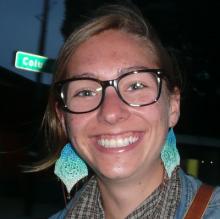Lindsey Heagy
Why did you decide to pursue a graduate degree?
Over the course of my undergraduate degree, the types of problems that geophysicists examine fascinated me. A graduate degree is a great opportunity to dive into one of these problems.
Why did you decide to study at UBC?
UBC has a strong reputation in science, especially in the earth sciences. I was interested in studying electromagnetic geophysics, and Doug Oldenburg and Eldad Haber are world-class researchers in charge of the Geophysical Inversion Facility here. Before deciding, I spoke with Doug over the phone and his excitement for the projects they were working on at the time, the ideas he had for the future and how I could be involved sealed the deal!
What is it specifically, that your program offers, that attracted you?
Geophysics uses physics to investigate what lies below the surface of the earth. Without drilling, we can obtain information about the physical property variations below our feet using physics!
I also enjoy the breadth of subjects and disciplines involved in the problems we examine. To characterize the subsurface, we integrate subjects including physics, math, computing science, and geology.
What was the best surprise about UBC or life in Vancouver?
There are a large variety of things to do on campus and around Vancouver. The community as a whole is very active, and it is easy to get involved.
What aspect of your graduate program do you enjoy the most or are looking forward to with the greatest curiosity?
Scientifically, there are many questions I am looking forward to diving into. So many of these questions require a variety of expertise and involvement with people from different backgrounds. The GIF group is a talented one, and I am excited to have the opportunity to learn with and from them.
I have also enjoyed and am excited to continue being involved with undergraduate education, through teaching and mentorship opportunities.
What do you see as your biggest challenge(s) in your future career?
I think that the biggest challenges tend to be the ones that you can’t anticipate.
How do you feel your program is preparing you for those challenges?
The variety of experiences I have had, including individual and team research project conferences, internships, conference presentations, and teaching opportunities, provide a foundation of knowledge to draw from. Having the chance to work through challenges in these settings, surrounded by supportive people, is great preparation for whatever comes.
What aspects of your life or career before now have best prepared you for your UBC graduate program?
I have been fortunate to have a number of people who have supported and mentored my through my education. In particular, during my undergraduate degree, David Lawrie, and in high school, David Westra, both helped fuel my scientific curiosity and challenged me.
What do you like to do for fun or relaxation?
I enjoy being in the outdoors, anything from hiking to climbing to snowboarding. Squamish and Whistler are great playgrounds not too far from here. Sushi in Kits with friends is also a highlight!
What advice do you have for new graduate students?
There are a lot of talented and inspiring people here, take the chance to learn from them. There are a variety of courses, clubs, and research projects on campus for you to take advantage of; they present great opportunities to be challenged and to broaden your experience.

